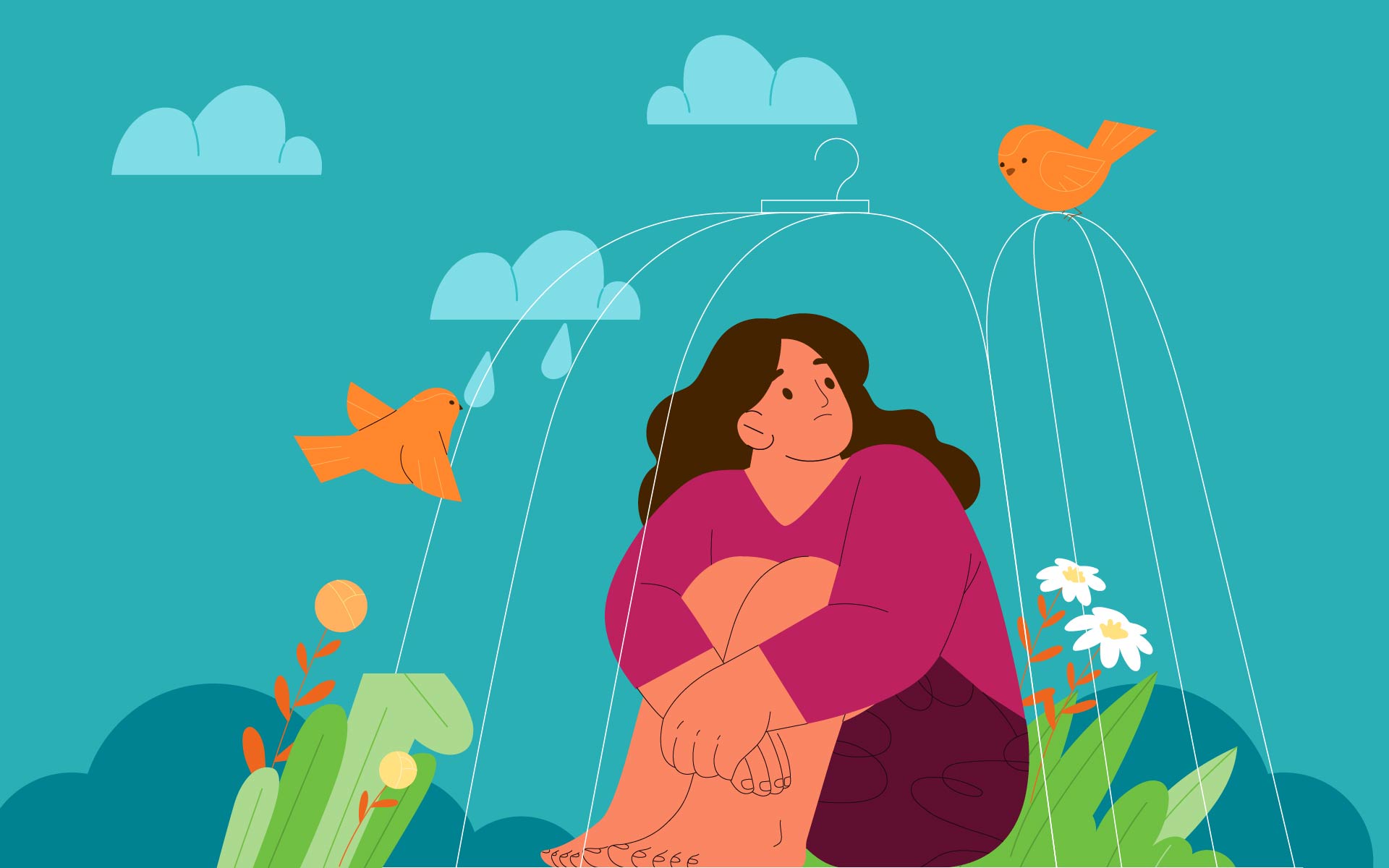1. Mindful Movement in Psychotherapy
How many movies or TV series have you seen depicting psychotherapy? Every time it’s the same scene. The therapist in a comfortable chair, their hands nested beneath their chin, listening intently or speaking wisely. Across from them sits the client on a chair or couch, usually a little more anxious. Salmon, a clinical psychologist teaching in the department of psychological and brain sciences at the University of Louisville, asks us: Is anything missing from this picture?

No movement. Because movement is, he says, traditionally “viewed as outside the realm of ‘talk therapy.’” Salmon—who is also a certified exercise physiologist, registered yoga teacher, personal trainer, and mindfulness teacher—encourages clinicians to consider incorporating “purposeful, mindful movement” in their interventions. He is not talking simply about exercise but about movement infused with awareness of what’s going on in body and mind, which can “provide a way to rekindle appreciation for our ability to move and be physically active.” Moving, he emphasizes, is baked into our DNA, but our lifestyles have greatly reduced it. Physical activity itself can create tangible experience that helps us be more than sedentary bodies with overactive brains, providing “an anchor to moment-to-moment reality.”
Salmon leads off by offering five progressively more engaged ways to bring movement into therapy. He then defines mindful movement and makes a case for it, as well as reviewing how mindful movement is used in existing clinical programs. From there,Salmon offers practical applications, first in a general way, and then for various kinds of conditions, such as anxiety, depression, PTSD, eating disorders, and addiction. There are also 29 audio guided practices that purchasers of the book can use personally or with clients.
2. Strange Situation: A Mother’s Journey into the Science of Attachment

Research has shown that our very earliest relationships affect everything we do later in life—”how we love, work, marry, create, lead, pray, scroll, drink, eat, study, sleep, have sex,” writes Bethany Saltman. As a new parent, troubled by the shadows of her emotionally neglected childhood, Saltman sought to come to grips with what “good” attachment is, how we can heal from the “bad” kind, and her own self. Attachment parenting is now de rigeur, she writes, but is often contradicted by the science of attachment, which she dives into headfirst with this moving memoir. Her journey explores the witnessing of sadness, hurt, and anger, and the universal desire to be seen. Attachment, she discovers, isn’t only about mothering —it’s available to any of us who truly delight in those dear to our hearts.
3. Keep Calm and Log On: Your Handbook for Surviving the Digital Revolution

The MIT Press
This handbook is crammed with practical information, from understanding bias to figuring out who owns a particular website. Andrews points out that the digital revolution—with its promise of connecting us all, extending access, and generally spreading more fun—often makes us feel more disconnected and proliferates disinformation. Her book is for those of us who feel “bad at” technology, addicted to it, or at a loss for how best to navigate a world dominated by it. She addresses FAQs around privacy, online etiquette, critical thinking, intimate online relationships, and more. Worksheets, practices, advice, and resources for further reading make this guide valuable for anyone who wants to better understand one of the defining revolutions of our time.
4. Well Nourished: Mindful Practices to Heal Your Relationship with Food, Feed Your Whole Self, and End Overeating

Fair Winds
This step-wise approach to healing our relationships with food offers worksheets, charts, graphs, prompts, and practices to lead readers through an inventory of how, what, and why we eat and overeat. Lieberstein outlines what she calls our “eight bodies”: physical, emotional, psychological, spiritual, social, intellectual, and creative. A lack of nourishment of one or more of those bodies may lead us to overeat, Lieberstein writes. Subsequent chapters focus on each of those bodies—with research-based information about the importance of each to our well-being, along with tools for tapping into awareness, setting intentions, and making changes to better nourish each of our bodies. Well Nourished is a practical, compassionate, customizable approach to an issue that can feel insurmountable—we have to eat to survive, but failing to address our relationship with food and overeating can stunt our ability to thrive and live fully.
5. Longer

A San Francisco medical doctor who is also an award-winning science fiction and fantasy author, Blumlein passed away in the fall of 2019 after a long illness. Longer is the work he produced during his final year and its principal theme is mortality. He presents a world where it’s possible to “juve,” to add another life span. With current pharmacology, one is able to safely add more “lives” twice (which is still not enough for some). Dream come true, right? Well…maybe. The fact that Blumlein himself was facing his own death while composing the novel gives it power and palpability that is the mark of the best kind of science fiction. Ironically, this is a book brimming with life.
Podcast Reviews
1. Emotional Badass
Managing our Feelings through the Coronavirus Crisis
As much as the world of podcasts offers entertainment, education, and news, it also provides valuable tools for mental and emotional support, in the very real and human moments when we need reassurance. In this episode of Emotional Badass, psychotherapist Nicki Eisenhauer calls on the life lessons she learned through surviving Hurricane Katrina. With both confidence and compassion, she voices the quiet inner truths we need to be reminded of right now: That our basic needs of food, shelter, and rest are top priority, even (especially) during a crisis. That having safe boundaries is a strength we can and must practice: “Sometimes saying no when we want to say yes is the most loving thing that we can do.” That financial worry is valid, and yet isn’t bigger than our ability to find a way. And that bearing witness to our storm of emotions creates space for loving-kindness, rather than blowing us over. Dr. Eisenhauer ends with a 10-minute guided meditation that powerfully affirms our own capability, strength, and resilience. Particularly worth remembering is her note that “Fear is not equal to how much you care.”
2. The 180 Podcast
Coronavirus: Keeping Our Children And Ourselves Safe, With Pamela Cantor, M.D.
Pamela Cantor, MD, discusses how to address the fear, stress, and disruption children and teenagers will likely experience during the pandemic. This hour-long episode discusses both physical and emotional safety—e.g., how we can encourage new practices, like more frequent handwashing and strict physical distancing. Helping them shift their behavior, without stressing them out more than necessary, means “patient persistence, enlisting [children and teens] in helping others, and understanding that others are being impacted even more than them.” For their emotional health? Truth and authenticity matter, says Dr. Cantor. Talk to your kids proactively, and answer their questions patiently. Parents should also model habits of well-being, as best they can: “Taking care of yourself, including using reflective practices like meditation, will help you care for others.” This episode is wonderfully well-rounded, grounded, and practical.
Read more from the June issue of Mindful magazine here.
read more
A Mindfulness Practice for Nonjudgmental Awareness
Explore this 15-minute guided meditation to open up some space for yourself to sit with what is, rather than what if.
Read More
A 15-Minute Meditation for Patience and Resolve
Developing a sense of equanimity is difficult—even in the best of times. This guided meditation from Mark Bertin offers a quiet moment to be patient with ourselves as we navigate discomfort and uncertainty together.
Read More
A 12-Minute Meditation to Widen Your Perspective
This guided mindfulness practice helps us relax and see the full scope of the possibilities in front of us.
Read More







